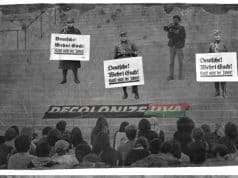by EE Greyson
“With many such parables He [Jesus] was speaking the word to them [the crowd], so far as they were able to hear it; and He did not speak to them without a parable; but He was explaining everything privately to His own disciples”
— Mark 4:33-34 NASB
The Discretion of The World’s Most Public Prophet and His Private Consultations
 During Jesus ministry, He was teaching His disciples in a more intimate setting where they might be able to absorb more of His teaching than the crowd might. We do not belong to a religion that teaches “special” or obscure knowledge to some and a different word to others as some do. But Jesus was showing discretion, that is discernment, on what His disciples could absorb and what the crowd could.
During Jesus ministry, He was teaching His disciples in a more intimate setting where they might be able to absorb more of His teaching than the crowd might. We do not belong to a religion that teaches “special” or obscure knowledge to some and a different word to others as some do. But Jesus was showing discretion, that is discernment, on what His disciples could absorb and what the crowd could.
Even though his disciples had been with Him constantly, they still didn’t understand much of what He said and so they received more clear instruction. The crowd which had much less time with Him and lacked both context and standing received a teaching fit for them. The point is that we deal differently with people depending on context and those settings may be more intimate and restricted or less so and broadcast.
The word “private” or “privately” in the Bible (used in 12 verses of the New American Standard Bible – NASB) usually means to do things in an intimate setting where one speaks differently to compatriots than to others. Not every thing is meant for everyone to hear. In an age of reality TV and oversharing on social media that is a lesson not well understood.
When we talk about a right to privacy, we likewise understand that there is a certain liberty that can only be enjoyed when one shows discretion in what and to whom one shares information. With liberty comes the freedom to pursue one’s goals without the drag of notoriety so many wish to have and that is more and more being forced upon us by our culture and government.
Invariably, when talking to unthinking persons about privacy one hears the insipid claim, “I don’t have anything to hide, I’n not a criminal.” It is true that criminals desire to hide their activities, but so do sane people seeking the best ends. Ask such fools for their social security number, bank account number, credit card numbers, taxes for the last seven years, and of course their passwords and they may or may not get the point.
In the Bible, the quality of understanding what is valuable and necessary to preserve is called discernment and the attendant quality of sharing what is precious with those who can benefit from it is called discretion. Jesus was showing discretion when He shared the meaning of His parables with His disciples.
When He avoided direct confrontations at some times and not others, Jesus was likewise showing discretion. My favorite example of this is when His own brothers attempted to goad Him into going to Jerusalem to observe the feast of booths as recorded in The Gospel of John, chapter 7. They didn’t believe Jesus was God in the flesh and so they wanted Him to show Himself publicly for the sake of notoriety. He refused the “offer” and after they went up, He also went up “not publicly, but as if, in secret.”
Was Jesus afraid? He could at a moment call down 72,000 angels, so that would be a foolish conclusion. It was about timing, and by showing discretion He could execute just the right action at the right time. Discretion gives you this freedom to do things on your own terms and best judgment, aka wisdom.
Discretion Can be a Tool of Good or Evil, How To Know Which Is Which
But privacy and discretion are not an unalloyed or intrinsic good. Discretion can be used for malevolent purposes as well as benevolent purposes. The word “discretion” is in the Bible only in the Old Testament and that word in Hebrew points to the machinations of the wicked as well as the sagacity of the righteous.
Thus as Christians, privacy is rightly practiced through discretion (aka “being discrete”) when the right ends are in view by the right means at the right time. Doing so will not violate the conscience where as just being shrewd might. Paul the Apostle wrote, “The faith which you have, have as your own conviction before God. Happy is he who does not condemn himself in what he approves. But he who doubts is condemned if he eats, because his eating is not from faith and whatever is not from faith is sin.” (Romans 14:22-23)
While Paul was talking about certain kinds of food in the referenced passage, this was simply a needful example of a greater principle. Here is the principle in full:
- Ground your principles in a greater authority than yourself, specifically in what God says
- Once you have that principle do not violate it
- The principle is violated by a wrong application that is never right or by applying it in a way that violates your conscience.
- Applications that are always wrong are so because they fail to reflect the character of God
- Applications that may reflect the character of God as He knows Himself to be, but which you are not yet acquainted with, will not be of faith but will violate your conscience.
Here are some corollaries that are important for proper application:
- Motive is very important. If you do the right thing for the wrong reason, you still incur guilt. You can hide your motives from others, and even from yourself but you never can hide it from God.
- Our hearts are deceptive even to ourselves. You may never know your own motives as God sees them, but you can clarify and correct them to a degree by the Word of God.
- You can understand the effect of your application only by the motive of love toward God and others, and receiving wisdom from the Holy Spirit through prayer. After all, you only get to know the character of God by spending time with Him and this is best accomplished by prayer over an open Bible
- Your ability to know the character of God is in direct proportion to the purity of your heart.
- Likewise, looking upon the holiness of God will purify the heart (Isaiah 6:1-7)
- The purity of your heart determines the range of applications that have the right motive, and will achieve the right ends.
Note especially the last bullet point. When you read the Bible you will see some interesting examples of discretion that might shock you. Here are a few:
- Rahab tells her fellow citizens two Jewish spies had left town while she was hiding them on her roof (Joshua 2:1-14). She was rewarded with her life and the lives of her family being spared when Jericho and its citizens were destroyed (Joshua 6:17-25). Even though she was a harlot, she was privileged to be in the line of Jesus Himself (Matthew 1:1-17, especially verse 5).
- Jonathan Sounds Out King Saul Regarding David (1 Sam 20:1-13)
- The “better” advice of King David’s friend Hushai to thwart the shrewd and deadly advice of Absalom’s counselor Ahithophel while Absalom led an insurrection to unseat and kill his father King David. (2 Samuel 15:30-37; 16:15-19; 17:1-23)
- Obadiah, master of Queen Jezebel’s household, hid 100 of Jezebel’s enemies, the prophets of the LORD. (1 Kings 18:1-16, especially verses 3-4, 9-15)
- The conspiracy of Jehoiada, the high priest, that led to the death of Queen Athaliah and the ascension of the rightful heir to the throne of Judah, King Joash (2 Chronicles 22:10-23:21)
- Nehemiah examining the condition of Jerusalem under cover of darkness (Nehemiah 2:1-16)
- Paul being let down through the wall of Damascus (Acts 9:22-25)
- Spying on those who would kill Paul, discovering their plot, and coordinating with the Romans to protect Paul (Acts 23:12-22)
There are many more examples of doing the right thing in a discrete way to produce a maximum good end whose means and end are glorious to God. But there are several others that, while reported in the Scriptures, are not necessarily so easy to distinguish. You will have to read, pray and rely on God for wisdom before you can tease out what God would approve and what He would not. This growth in discernment, and attendant discretion, is tied directly to your greater comprehension of God’s character and His greater apprehension of your entire life.
How to Have the Right Principles For Application
Now, while I have given a brief overview of how to apply principles to applications, I shall briefly explain how to derive right principles for those applications.
- NEVER hide in the darkness but always stand in the light
- God is light and in Him there is no darkness at all. This is true even when He covers Himself in darkness.
- We who are in Christ are all sons of light
- We who practice the truth necessarily come to the light
- The wicked will never come to the light
- The darkness can neither comprehend nor apprehend the light
- If you stand in the light, those in darkness can’t find you and will not generally perceive what you are doing unless you advertise it for the sake of notoriety. Remember, notoriety kills freedom of action more often than it abets it.
- NEVER use “discretion” to deny your Lord or hide the light that is in you. It is better if God should will it so to suffer for His name than to protect your own before a wicked world.
- NEVER disclose a rightly placed confidence
- NEVER hide a confidence that is sinfully placed
- The wise hide themselves when they see evil, the naive do not and pay for it
- You can never hide from God, but you can always hide in God
Human Instruction Is Not Enough, You Must Be With God
The proper application of these instructions to your situation, your calling, and your walk with the Lord in His service will require much prayer and the reading of His Word which is why I’ve tied most of what I have written above to that Word. As I said before, I can only point you in a direction. It is you who must walk and it is the Lord who is your Savior and hope of victory even in seeming defeat.
By these things little old ladies have smuggled in suitcases of Bibles into closed countries, churches thrive and are rapidly growing where you can’t imagine they exist, tyrants have been defeated and Christ’s church resists the gates of hell. People talk about being on the “right side of history” but do not consider who writes that history. In the near term this will be men, some very lost ones. But in the end, it is the history that God writes, has already written before the foundation of the world, that stands for eternity.
You Can Not Always Avoid Persecution: There Is No Neutral Ground
Men have given their treasures, their families, and their lives as well in this warfare. And we count those who have as worthy of greater glory. If you aren’t fully Christ’s, then you are still a worldling. You are either in the enemies camp or soon will be. There is no neutral ground. And those who have one foot in the dark and one foot in the light shall be rejected by both. But we’ll examine this in the next two articles.
When Some Things Are Not in Play and When They Are
We do well to seriously consider Christ’s answer to the question about whether to pay taxes to Caesar or not (Luke 22:20-26), Paul’s exhortation to honor and obey governments (Romans 13:1-7), and Peter’s instruction to submit yourselves to human authority (1 Peter 2:13-17)
- When governments, even wicked governments, are generally fulfilling the mandates and warrant of God for human government, to punish evildoers and reward the righteous, you are to submit and obey that government in all things not prohibited by Scripture.
- When governments have become beastly, that is, wield power only for their own sake and have become unmoored from God’s law in very great degree (calling good evil and evil good), then your resistance of that government is an obedience to God.
Clearly some things are not in play when governments are better than no government at all (Case #1 above) but may be in play when any other government is better than that government (Case #2). There is a pretty high bar placed in Scripture requiring submission to human government but it is never so high as to displace the ultimate government of God. Time with God in Word and prayer, lots of it, and time with other godly men giving wise counsel, will usually be required if you think Case #2 applies.
Summary
Watch over you heart with all diligence
If your heart is clean
Your conscience will be whole
Your eye will be clear, your mind full of light
Your duty will be before you and you will have full liberty to move to counter the enemy
Helpful Books
On preparing for the tyranny to come
Live Not Lies by Rod Drehr
On the cost of being “invisible”
The Art of Invisibility by Kevin Mitnick
Ghost in the Wires by Kevin Mitnick
On techniques of evasion (use with caution, the techniques are old and likely make you a target)
The Official CIA Manual of Trickery and Deception by H. Keith Melton and Robert Wallace
Surveillance and Surveillance Detection: A CIA Insider’s Guide by John Kirikau
Master of Disguise: My Secret Life in the CIA by Antonio J. Mendez and Malcolm McConnell. This one is a fun read but also shows just how flimsy a disguise and a CIA-created, backstopped alias really are.
Note: We are not the CIA, unless you mean Christians In Action, and using these techniques wrongly will likely get you killed. Even using them rightly will draw unnecessary attention to you and those who know you. You have not been trained to spy (aka act covertly) and those in the covert detection business are much better trained at catching spies than you are a pretending to be one.
Books to help you think well before and in tight situations
A Spy’s Guide to Thinking + Strategy by John Braddock
A Spy’s Guide to Taking Risk by John Braddock
Special Note: In most cases, it’s the panic that will get you caught and/or killed and not the situation itself. Keep your wits about you and your communication with God clear; you’re much more likely to have a less painful result by doing so. Still, in the end, it is God who will determine the result and any consequences suffered thereby.







